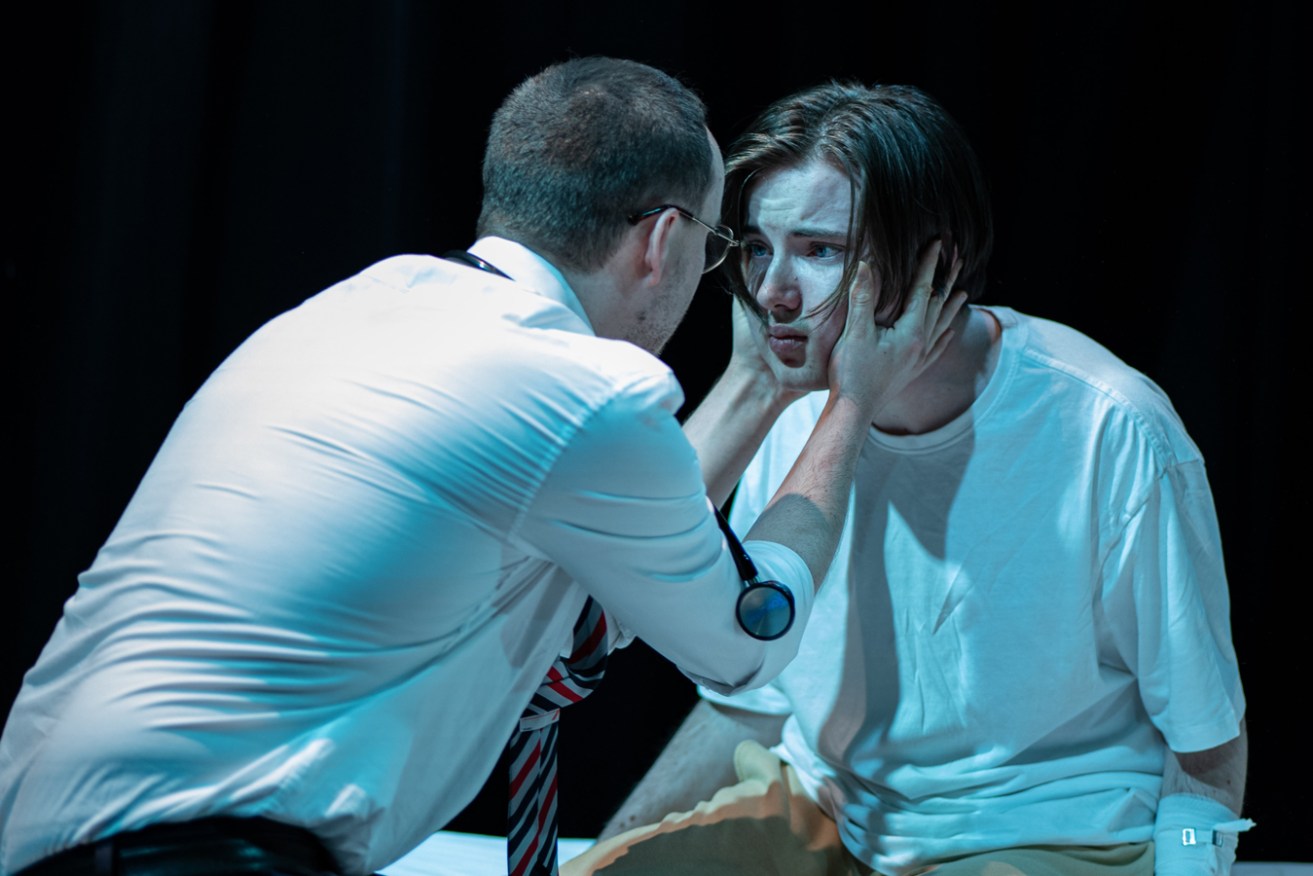Theatre review: 4.48 Psychosis
The irreplaceable beauty of live theatre is highlighted in this refreshing new take on British playwright Sarah Kane’s heart-wrenching exploration of mental illness and the yearning for human connection.


Arran Beattie and Rhys Stewart in Famous Last Words' production of '4.48 Psychosis'. Photo: Philippos Ziakas / supplied
“At 4.48, when sanity visits, for one hour and twelve minutes I am in my right mind.”
For one hour and twelve minutes, Sarah Kane’s last play, 4.48 Psychosis, dives into the fragmented mind during a depressive episode. Written shortly before the British playwright’s suicide, it contemplates death, the cruelty of life, and the meaning of the world through a series of poetries and aching soliloquies.
Adelaide’s Famous Last Words (whose previous works include Miss Julie and Proud) has skilfully transformed the stage of a 215-seat theatre into an intimate black box. Designer Ruby Jenkins’ minimalist approach is effective and smart. With a white mattress on a raised platform, she elegantly creates a dynamic space that can be imagined as any setting. The mental disorder books messily scattered on the bed convey the mental state of the character(s).

The lighting design of 4.48 Psychosis is wonderfully choreographed to the emotions of the performance. Photo: Philippos Ziakas
The beauty of 4.48 Psychosis lies in its lack of specified settings or characters. In Famous Last Words’ production, directed by James Watson with assistant director Emelia Williams, the texts are precisely distributed between two actors: Rhys Stewart as a psychiatric patient and Arran Beattie as the doctor/lover/others. Stewart is a versatile actor ranging from spoken-word-style delivery of poetries to the micro-expressions of a person struggling with mental health. Beattie’s performance is captivating and convincing; his transitions between characters are seamless and applaudable, although hard to follow at times.
The delegation of the texts in this version solidifies the psychiatric patient’s relationships with his lover and doctor. With the “positive” lines mostly assigned to Beattie, the play reminds us that people around us care. It exemplifies how the negative impacts of mental illness can radiate from one mind to another. Conversely, this interpretation diminishes the internal conflicts one experiences when they are considering suicide.
Composer Reggie Parker’s sound design provides an eerie and ethereal ambience, beautifully depicting the heightened senses during an episode of psychosis. The score considers how the original script is organised in 24 sections. As the actors progress through the performance, audience members can rely on the music to inform them of the changes in settings and/or characters.
The lighting design is wonderfully choreographed to the staging and emotions of the performance. At times, it is achieved merely by an LED torch operated by the actors. It shows the irreplaceable beauty of live theatre – that it is present and raw.
“At 4.48, when depression visits…”
Depression and sanity visit at the same time. Medication numbs the mind. Along with depression goes sanity. It is a sad reality that one sometimes needs to sacrifice the ability to feel in order to stay alive. 4.48 Psychosis attempts to find human connection when one is numb. Perhaps one cannot feel it. Perhaps knowing it exists is comforting enough.
4.48 Psychosis is a heart-wrenching play. However, owing to Kane’s dark humour, you might catch yourself giggling in the middle of an intense scene. She saw through the absurdity of reality. Beyond the depression, she was a witty, wise, and charming artist. Her work contains depth and endless possibilities for creatives to explore. Famous Last Words’ presentation is refreshing and full of interesting twists. It urges us to look for the light in the darkest place.
Famous Last Words is presenting 4.48 Psychosis at the Goodwood Theatre and Studio until November 10.
If this article has raised issues for you, you can get help 24/7 by phoning Lifeline on 13 11 14 or the Suicide Call Back Service on 1300 659 467. If you or someone you know is in immediate danger, phone 000 for emergency services.
Nicky Tsz Tung Li is the fourth recipient of the Helpmann Academy InReview Mentorship. She is working with experienced writer Samela Harris to write a series of articles for publication on InReview.
This article is republished from InReview under a Creative Commons licence. Read the original article.
InReview is an open access, non-profit arts and culture journalism project. Readers can support our work with a donation. Subscribe to InReview’s free weekly newsletter here.
![]()




